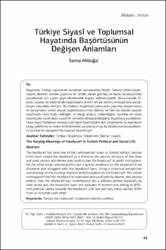| dc.contributor.author | Akboğa, Sema | |
| dc.date.accessioned | 2021-02-03T08:17:27Z | |
| dc.date.available | 2021-02-03T08:17:27Z | |
| dc.date.issued | 2020 | en_US |
| dc.identifier.citation | Akboğa, S. (2020). Türkiye siyasî ve toplumsal hayatında başörtüsünün değişen anlamları. Liberal Düşünce, 25(98), 83-101. https://doi.org/10.36484/liberal.692152 | en_US |
| dc.identifier.issn | 1300-8781 | |
| dc.identifier.issn | 2667-6486 | |
| dc.identifier.uri | https://doi.org/10.36484/liberal.692152 | |
| dc.identifier.uri | https://hdl.handle.net/20.500.12511/6495 | |
| dc.description.abstract | Başörtüsü Türkiye siyasetinin tartışmalı konularından biridir. Seküler elitler başörtüsünü devletin seküler yapısına bir tehdit olarak görmüş ve kamu kuruluşlarında yasaklamak için çeşitli gayri demokratik araçlar kullanmışlardır. Buna karşılık, İslamcı siyaset de söyleminde başörtüsüne önemli bir yer vermiş ve başörtüsü yasaklarıyla mücadele etmiştir. Bu makale, başörtüsü konusunda yapılmış araştırmaları ve tartışmaları temel alarak; başörtüsünün hem İslamcı ve hem de seküler siyaset tarafından nasıl ifade edildiğini ve hangi amaçla kullanıldığını, özellikle de erkek siyasetçiler tarafından siyasî bir sembole dönüştürüldüğünü, başörtüsü yasaklarını, farklı siyasî kamplara mensup kadınların başörtüsüne dair tutumlarını, bu kadınların hangi şekillerde ve neden birbirlerinden ayrıştıklarını ya da birbirlerine benzediklerini tarihsel bir perspektif kullanarak incelemiştir. | en_US |
| dc.description.abstract | The headscarf has been one of the controversial issues in Turkish politics. Secular elites have viewed the headscarf as a threat to the secular structure of the state and used various anti-democratic tools to ban the headscarf at public institutions. On the other hand, Islamist politics put a special emphasis on the headscarf in its discourse and struggled with the headscarf bans. Using a historical perspective and drawing on the existing research and discussions on the headscarf, this article investigated how the headscarf is expressed and used both by Islamic and secular politics, how the headscarf was transformed into a political symbol especially by male politicians, the headscarf bans, the attitudes of women who belong to different political camps towards the headscarf, and how and why these women differ from or resemble each other. | en_US |
| dc.language.iso | tur | en_US |
| dc.publisher | Liberte Yayınları | en_US |
| dc.rights | info:eu-repo/semantics/openAccess | en_US |
| dc.subject | Türkiye | en_US |
| dc.subject | Başörtüsü | en_US |
| dc.subject | Sekülerizm | en_US |
| dc.subject | İslamcı Siyaset | en_US |
| dc.subject | Turkey | en_US |
| dc.subject | The Headscarf | en_US |
| dc.subject | Secularism | en_US |
| dc.subject | Islamist Politics | en_US |
| dc.title | Türkiye siyasî ve toplumsal hayatında başörtüsünün değişen anlamları | en_US |
| dc.title.alternative | The varying meanings of headscarf in Turkish political and social life | en_US |
| dc.type | article | en_US |
| dc.relation.ispartof | Liberal Düşünce | en_US |
| dc.department | İstanbul Medipol Üniversitesi, İnsan ve Toplum Bilimleri Fakültesi, Siyaset Bilimi ve Kamu Yönetimi Bölümü | en_US |
| dc.authorid | 0000-0003-0937-9961 | en_US |
| dc.identifier.volume | 25 | en_US |
| dc.identifier.issue | 98 | en_US |
| dc.identifier.startpage | 83 | en_US |
| dc.identifier.endpage | 101 | en_US |
| dc.relation.publicationcategory | Makale - Ulusal Hakemli Dergi - Kurum Öğretim Elemanı | en_US |
| dc.identifier.doi | 10.36484/liberal.692152 | en_US |


















